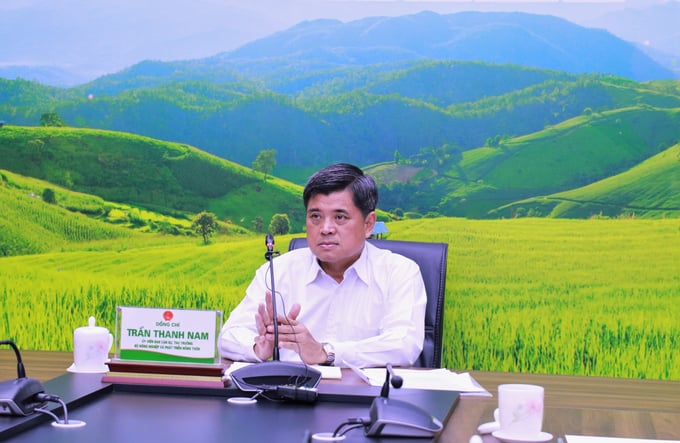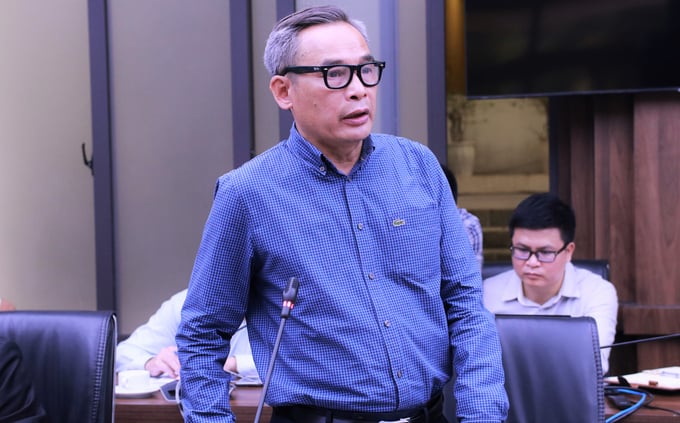May 22, 2025 | 19:03 GMT +7
May 22, 2025 | 19:03 GMT +7
Hotline: 0913.378.918
May 22, 2025 | 19:03 GMT +7
Hotline: 0913.378.918
On November 10, Deputy Minister of Agriculture and Rural Development Tran Thanh Nam and leading experts in Vietnam's agriculture sector had a meeting with international partners and organizations to exchange and discuss a number of issues concerning the Scheme for sustainable production of 1 million ha of high quality rice in the Mekong Delta.

Deputy Minister Tran Thanh Nam chaired the discussion session on the Scheme for sustainable production of 1 million ha of high quality rice in the Mekong Delta.
Deputy Minister Tran Thanh Nam said that both domestic and foreign agricultural industries shared the same consciousness of the role and value of Vietnamese rice, especially in the Mekong Delta, which is identified by the Government as an area of food security - the key rice area of Vietnam. The Mekong Delta currently has a cultivation area of approximately 1.7 million ha, producing about 24 million tons of rice annually. Regarding variety issues, domestic units and producers are now proactive in terms of varieties and production processes.
The Ministry of Agriculture and Rural Development (MARD) and experts have considered many matters concerning the development of high-quality rice areas in the Mekong Delta. From the MARD’s point of view, at present, high-quality rice is more than about variety. Variety is just a basic factor. High quality rice is also defined by the cultivation procedure, rice, and rice grain value.
“That is why recently the Ministry of Agriculture and Rural Development has consulted many agencies, departments and experts, advised the Government and received the approval of the Prime Minister to develop the Scheme for sustainable production of 1 million ha of high quality rice in the Mekong Delta. We understand that this policy is also what producers, businesses and many experts in the Mekong Delta have longed for.
In order for the scheme to be successful, the MARD has clearly identified that there requires a certain change in production mindset to ensure this 1 million ha is in line with the aspirations of farmers, businesses as well as the management forces in localities," said the Deputy Minister.
Director of the Department of Crop Production Nguyen Nhu Cuong presented some general orientations in the implementation of the scheme at the discussion session.
The Mekong Delta is a key rice production area with the most advantages in Vietnam, contributing over 50% of rice yield and 90% of rice for export. However, rice production in the Mekong Delta still has certain limitations. Quality, efficiency, added value and competitiveness of the rice industry in this area are low; rice is exported in large volume, the value and selling price of rice have shown signs of improvement, but the overall efficiency of rice exports remains incommensurate with the existing conditions. The income of rice farmers is low and inferior to the income of other factors in the rice business and export chain. Moreover, the lack of sustainable rice production has left a number of negative impacts on the environment and climate change.

Director of the Department of Crop Production Nguyen Nhu Cuong: "The most important thing for the development of the scheme, besides the coordination and support of international organizations, is to attract businesses to join this journey".
Director Nguyen Nhu Cuong relaid the scheme’s main contents and orientations: The scheme will conduct an assessment of Mekong Delta’s current rice cultivation status, in which priority is given to rice land policy and investment attraction policy to support localities to complete infrastructure in service of production - processing - trading; develop credit incentives for enterprises producing machinery, input materials, supplying seeds and investment enterprises; support the application of good agricultural practices, reduce emissions; support policies to encourage linkages in production, consumption and construction of big field models.
The scheme will also focus on building a sustainable production area specializing in high-quality rice cultivation of 1 million ha with the main tasks including assessment of potential, natural and socio-economic advantages of cultivated land; identification of the location of the specialized cultivation area according to each locality and ecological zone; formulation of plans for production, processing and consumption; proposals for sustainable development solutions.
Director Nguyen Nhu Cuong also emphasized the role of businesses on the journey to implement this scheme. "The most important thing for the development of the scheme, besides the coordination and support of international organizations, is to attract businesses. Without the participation of businesses, I think it would be difficult for the scheme we develop to achieve the desired results".
Translated by Samuel Pham
![Reducing emissions from rice fields: [2] Farmers’ commitment to the soil](https://t.ex-cdn.com/nongnghiepmoitruong.vn/608w/files/news/2025/05/05/dsc08881jpg-nongnghiep-140632.jpg)
(VAN) Clean rice cultivation model in Thuong Tan commune, Bac Tan Uyen district, is assisting local residents in achieving sustainable agriculture by substantially reducing costs, increasing productivity, and protecting the environment.

(VAN) At the conference to disseminate Resolution No. 68, AgriS introduced its digital agricultural ecosystem and reaffirmed its commitment to accompanying the Government in promoting private sector development and sustainable agriculture.

(VAN) 'Blue Ocean - Blue Foods' initiative is designed to restore marine ecosystems and establish sustainable livelihoods for local communities by cultivating a minimum of 1,000 hectares of cottonii seaweed in the first three years.
/2025/05/21/4642-3-112707_603.jpg)
(VAN) The V-SCOPE project has made direct contributions to three out of six pillars of the Comprehensive Strategic Partnership between Vietnam and Australia.

(VAN) Facing the threat of rabies spreading to the community, Gia Lai province urgently carries out measures to vaccinate dogs and cats on a large scale.

(VAN) Disease-free livestock farming not only protects livestock herds but also stabilizes production and livelihoods for many farmers in Tuyen Quang.

(VAN) Japan's grant aid project contributes to capacity building, promoting organic agricultural production, and fostering sustainable community development in Dong Thap province.